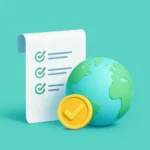The EU’s newest tax directive, DAC7, which applies as of 1 January 2023, imposes new obligations on online marketplaces. In this article, we discuss the details of DAC7, who it applies to, and the implications it can have on you and your business.
Originally published in July 2020, the Council of the European Union adopted new eCommerce reporting obligations known as DAC7 on March 22, 2021. These updated mandates require EU states to disclose tax information on certain goods and services sold online via digital platforms. Many member states under DAC7 have already compiled the reports to prepare for the change, which will go live on January 1st, 2023.
DAC7 defines a digital platform as any software, including websites or mobile applications, that allows sellers to connect with other users to carry out a relevant commercial activity. Amazon, eBay, and Google – or any eCommerce company – are subject to the new rules under the DAC7 Directive.
Not sure if your organization needs to comply with DAC7? Keep reading to learn more about DAC7 and why you’ll need it to position your company for success in 2023.

This article covers
What is the DAC7 Directive?
DAC7’s official name is the Council Directive (EU) 2021/514 of March 22nd, 2021, amending Directive 2011/16/EU on administrative cooperation in the field of taxation. Generally, these new rules from the European Commission instruct digital platforms to disclose sales and revenue information about their sellers.
DAC7 covers the EU, but it also extends the requirements overseas. The mandate enables EU members to share vital tax data with each other, increasing the efficiency of the exchange of information overall. These updates allow tax authorities to accurately assess income and VAT taxes for both the seller and government stakeholders.
What needs to be reported under DAC7?
The new rules will require reporting after January 1st, 2023, to identify applicable sellers and collect information on non-excluded businesses. Due diligence provisions also call for the verification of reliability in gathered data.
The following information must be disclosed to the tax authority:
- Seller’s name and address
- Country of residence
- Financial details
- Tax identification number
- VAT or business registration numbers
- Consideration paid or credited per quarter
- Any fees, commissions, or taxes withheld
Information will also be required when dealing with immovable rental properties.
Businesses must be aware that General Data Protection Regulation (GDPR) still needs to be adhered to for reporting EU DAC7 data. Operators need to inform each seller how their individual details will be collected and reported per the DAC7 Directive.
How are platforms impacted by DAC7?
As long as the platform drives eCommerce, DAC7 reporting applies to operators who are tax residents in the EU. Companies incorporated or controlled in the EU also need to comply if they have a permanent presence in the zone.
For Platform Operators
Platform operators will need to collect and store additional data points for complete DAC7 reporting. However, data only needs to be collected after a 2,000 EUR threshold on earnings
For Platform Sellers in the EU
Sellers will need to provide additional information to the platform. All earnings will be reported to the approprate tax authorities in the EU. This apply to:
- Individuals who are residents of an EU member state providing services on a platform.
- Individuals located anywhere in the world, who are renting real estate located in the EU.
What kind of businesses does DAC7 apply to?
The reporting obligations required by DAC7 only apply to the following businesses:
- Platform operators that are tax residents or established in the European Union (either by incorporation or permanent establishment)
- Foreign platforms performing commercial activities within the EU sans any legal presence
If your business falls within these definitions, you must report under DAC7. Examples include:
- Rental of immovable property, both residential and commercial, including parking spaces
- Provision of personal services
- Sale of goods
- Rental of any mode of transport
Tech companies that facilitate payments, advertising, or those that redirect users toward another site, do not qualify.
What are the penalties?
In short, the penalties can be significant for those who do not comply by January 1. Each DAC7 member is responsible for levying fines, yet the punishment varies per country. For example, the penalty in the Netherlands can be as high as €900,000. The fine in Poland will range between PLN 100,000 – 5,000,000, or the equivalent of €21,000 – €1,000,000.
What timelines apply to DAC7?
The regulations go into effect on January 1st, 2023 for all EU member states. You will need to collect the required data from net new sellers on your platform that meet the DAC 7 eligibility criteria. You have until 2023 tax reporting– due January 31st, 2024– to report existing sellers on your platform.
Note that existing sellers (users that join before DAC7 goes into effect: Jan 1, 2023) are reportable for 2024 earnings by Jan 31, 2025 – essentially giving you an extra year to collect and report all the required information.
The operator must file a report with the tax authority of the EU member state and disclose activity in other nations.
Non-EU companies may need to register and submit reports to a member state of their choosing. However, if data is already shared via a contract between the nation where the operator is based and a member state, they might not need to report in the EU.
How to Prepare for DAC7
To prepare for the requirements of the new EU DAC7 Directive as platform operators:
- Check with your tax advisor if you’re required to comply with DAC7 and whether the platform’s activities require reporting
- Analyze the data currently being collected from sellers, identify missing data, and update the data collection procedures
- Identify the IT systems and procedures required to meet the DAC7 reporting and due diligence rules
- Consider how DAC7 will affect contracts with sellers and create an adequate plan of action plan accordingly
- Identify any potential concerns for data protection
- Keep an eye out for any scope changes in domestic legislation and determine if further action is required
Summing it all up
The new EU regulations on digital platforms will go live on January 1st, 2023. The requirements for reporting under DAC7 mean that tech companies must report certain information on their sellers, including names, locations, and financial data. Businesses must also continue to comply with GDPR when it comes to the reporting of data from EU DAC7, so operators who are lagging behind their peers in this regard may have a harder time and need to get up to speed on two fronts. It is, therefore, important to start thinking about DAC7 implications now.
Curious about what Trolley can do to help your online marketplace comply with DAC7 regulations when paying EU sellers? Learn more about the new DAC7 compliance product or follow our step-by-step guide to enable DAC7 features in your account. See Trolley Tax in action: Take the Trolley Tax tour
If you have any questions about DAC7, feel free to reach out, and we’d be happy to help!
This article is intended for educational and informational purposes only. Through the publication of this article, Trolley is not offering any legal, taxation, or business advice. We strongly encourage each reader to consult with their relevant lawyer, accountant, or business advisors with respect to the content of this post. Trolley assumes no liability for any actions taken based on the content of this or other articles.












